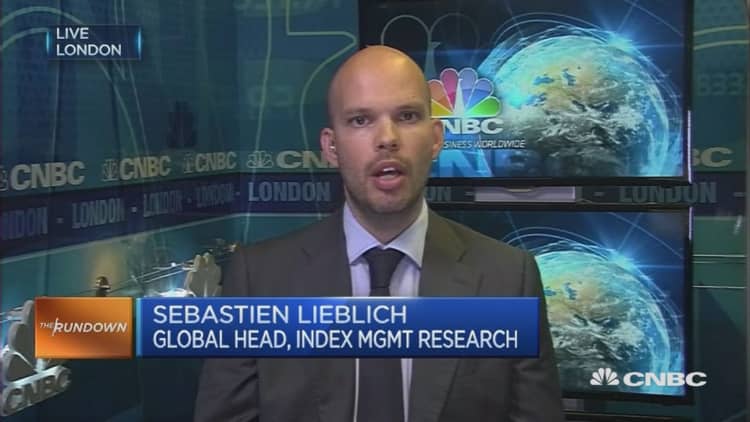
MSCI's decision to keep mainland-listed shares out of its key emerging markets index was a blow to China's regulators, who had stepped up reforms in recent months to win over the index provider.
But the initial reaction from China was largely pragmatic, with state news agency Xinhua commenting that inclusion was "purely just a matter of time."
The Shanghai composite and the Shenzhen composite opened down more than 1 percent each, but then retraced their losses to trade up 0.33 percent and up 1.44 percent respectively by mid-morning SIN/HK.
MSCI announced on Tuesday evening ET that it had once again decided not to include A shares in its EM index.
The index operator said, "International institutional investors clearly indicated that they would like to see further improvements in the accessibility of the China A shares market before its inclusion in the MSCI Emerging Markets Index."
MSCI said investors needed more time to assess the effectiveness of the Qualified Foreign Institutional Investor program (QFII) investment quota allocation, capital mobility policy changes and the effectiveness of the new trading suspension policies.
"The 20 percent monthly repatriation limit remains a significant hurdle for investors that may be faced with redemptions, such as mutual funds, and must be satisfactorily addressed," the index operator said.
Remy Briand, MSCI's global head of research said in a conference call after the decision was announced that even though there had been moves by the Chinese government to improve market operations, it was still lacking in some areas.
The high number of voluntary suspensions also need to be brought down, Briand added. He told the call that 6-10 percent of the A-share universe was suspended at any given time, compared to an average of 0.2 percent across all emerging markets.
"The number of [A share] suspensions hasn't gone down significantly," he said.
Chinese stocks currently listed in MSCI's EM index are traded in Hong Kong or the U.S., which means the world's second-largest economy makes up only about one-fourth of the benchmark index, while projected full inclusion of A shares would bring that ratio to more than one third.
With about $1.5 trillion in assets under management tracking the index, China is keen to tap those funds as foreign investors search for returns outside their home markets.
Adrian Mowat, JPMorgan's chief emerging market and Asian equity strategist, said that recent talk about inclusion missed the point that China's markets needed to meet "very specific criteria the MSCI has set out - which it has not fully met."
"This is not a judgment issue, they are not snubbing China. It's simply you have to meet certain requirements for the benchmark and those requirements haven't changed," said Mowat.
And JPMorgan's chief China economist Haibin Zhu said that inclusion could take "a few more years."
In the case of South Korea, it took six to seven years to be included in the EM index, he noted, adding, "In China's case, 10 years is probably not surprising."
But Goldman Sachs' global macro research analysts wrote in a note after the decision that they were surprised by MSCI's call. On May 30 the analysts had raised their estimate of the probability of inclusion from 50 percent to 70 percent, given the strides Chinese regulators had recently made in addressing investors' concerns.
Goldman Sachs said that if reforms continued apace, it expected MSCI to do a special, out-of-cycle, review of inclusion before the next annual review was due in June 17, and that that review would likely find "significant breakthroughs" on the remaining hurdles.
Angus Nicholson, market analyst at spreadbettor IG, was pointed in his analysis of the decision.
"In some ways, it was more surprising how many investment banks came out saying inclusion was more likely than not. I think this may reflect just how aggressive Chinese government campaigning was for inclusion at this round," he wrote in a note on Wednesday.
"But very recent changes to stock suspension laws was unlikely to make everyone forget about the massive state intervention in the market of the past year. Or the disastrous introduction of trading 'circuit-breakers' in January that did an excellent job of accelerating the market selloff, and eventually cost Xiao Gang his job as the head of the China Securities Regulatory Commission (CSRC)."
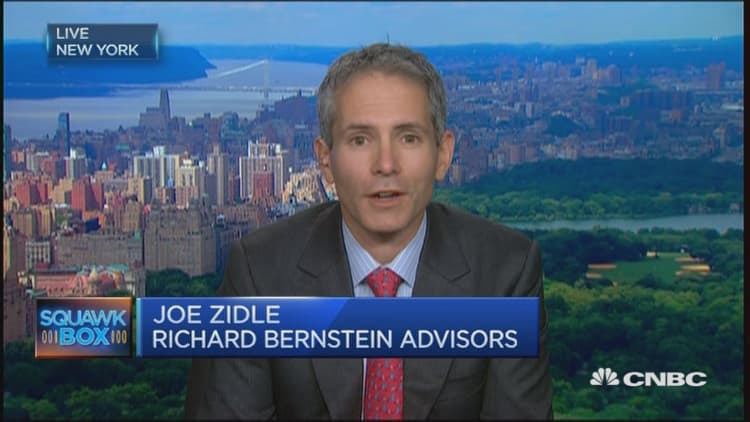
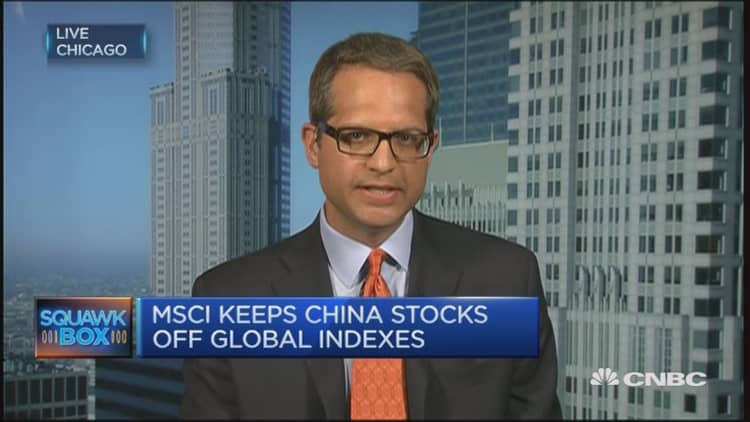
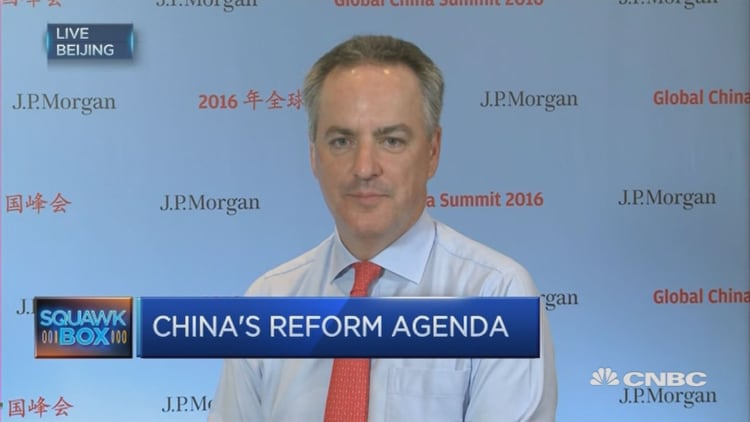
At the weekend Xavier Rolet, chief executive of the London Stock Exchange, had called for A-shares to be added to the MSCI EM index, saying it was critical for global investors.
At the same time, Qi Bin, head of the international cooperation department at the CSRC, said that a global index was incomplete without Chinese stocks, warning that MSCI could not wait until Chinese markets were "perfect" to include A-shares in the index.
After MSCI's decision was announced, the CSRC reiterated Qi's point about the need for Chinese shares in any benchmark index.
"It is MSCI's business decision as to whether or not to do so," CSRC spokesman Deng Ke said in a statement. "The MSCI decision on postponing to include A-shares will not affect the ongoing reform and open-up process of Chinese capital markets, as well as our direction of marketization and legalization. It is our own need to build a long-term [and] permanently stable and robust capital markets."
News agency Xinhua, which is often read as a proxy for Beijing's opinions, was cautiously optimistic in its response, repeating Qi's argument that any international index that did not include the world's largest emerging market - which Xinhua said was also the world's second-largest capital market and its fastest-growing market overall - was incomplete.
"There is no need to be irritable that A-shares failed to be included in MSCI," Xinhua wrote on Wednesday morning. "This only indicates that the building of the structure and system of A shares must be proceeded. Historically, it will be a 'must' for A shares to be included in MSCI; it's purely just a matter of time."
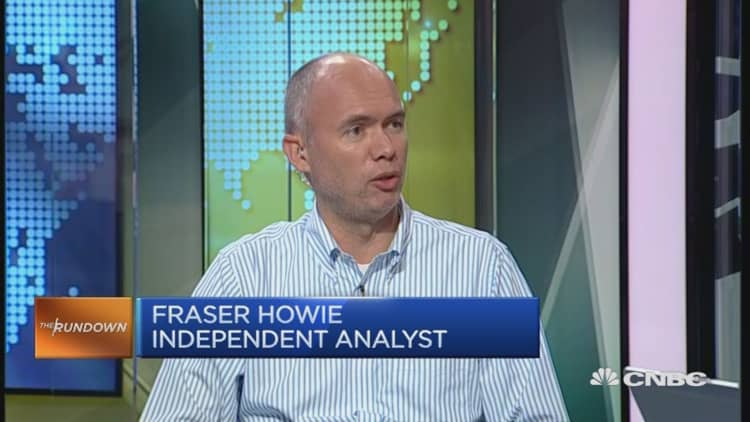
The delay in the inclusion was a talking point Weibo, China's version to Twitter, where some users pointed out deficiencies in the stock market system.
"Given the fact that China's stock market regulator is not only the player but also the judge, the full-of-weaknesses A shares certainly has a long way to go," posted a user called Stock Talker.
Another poster, with the username Second Generation Of Mountain Village Farmer, wrote, "Anyone who has clear mind knows it is impossible for the Chinese stock market with such an awful system to be included in MSCI. Maybe another ten years..."
"It would be a huge joke if China's A shares is included on MSCI!" wrote Iron Tree Blossom.
Others were more suspicious that it was an anti-Chinese move, rather than a reflection of the country's stock market.
"I just realized China's problem today is that more and more countries are not willing to play with us and they have been gradually alienating us. MSCI's decision proved it, same as TPP and TTIP. But after all, it's because we only want the benefits instead of rules and fair play." wrote Shanghai Guest In Canada.
- Evelyn Cheng and Haze Fan contributed to this report.

